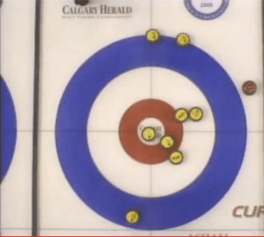Eight-ender
 Final stone placement when Kelly Scott scored an eight-ender against Cathy King at the 2006 Player's Championship |
An eight-ender, also called a snowman, is a perfect score within a single end of team curling. In an end, both sides throw eight rocks, and in an eight-ender, all eight rocks from one team score points.
Eight-enders are extremely rare in competitive curling and are analogous to a perfect game in baseball or a perfect game in bowling (300). Eight-enders are so rare that the Canadian Curling Association has an eight-ender award to recognize any eight-ender scored in Canada.[1] In 2007 Asham Curling Supplies awarded an $8000 prize randomly to one of the 145 teams that registered an eight-ender in the 2005–06 curling season.[2]
The eight-ender in team curling is synonymous with the six-ender in mixed doubles curling.
Occurrences
Consecutive eight-enders
In 1993, the team of Kim Gellard, Corie Beveridge, Lisa Savage, and Sandy Graham recorded two consecutive eight-enders while playing in a school league.[3]
Scott vs King
Perhaps the most famous eight-ender occurred at the 2006 Players' Championships in Calgary, Alberta on April 15, 2006. The tournament was the final Grand Slam event in the 2005-06 Grand Slam of Curling and had a CAD$100,000 purse – one of the largest in women's curling.
The match between Kelly Scott, who at the time was the reigning Canadian women's champion and went on to become a world champion, and Cathy King a former world bronze medalist. In the 6th end of their match, King and her rink played rather poorly, while Scott and her rink capitalized on King's mistakes. King ricocheted her final stone out the side of a crowded house, leaving Scott a draw for 8. Although her shot was heavy, Scott's rock came to a stop eighteen inches from the back of the house, enough to score her eighth point.
Leskiw vs Hamblin
Another notable eight-ender occurred on January 22, 2011 at the MCA Bonspiel, the world's largest bonspiel. In this match Leskiw stole his eight points. In curling, when the team that does not have last rock in the end scores, the points scored are termed as stolen points. In this game, Leskiw managed an eight-ender even though Hamblin had the last rock, which gave him the opportunity to score or prevent Leskiw from scoring eight. In fact, Hamblin knocked Leskiw's eighth rock into the house with his final shot, turning a seven point end into an eight-ender.[4]
Jacobs vs. Phillips
Brad Jacobs scored an eight-ender in the sixth end of the semi final of The Dominion 2012 Northern Ontario Men's Curling Championship against Tim Phillips in Sault Ste. Marie, Ontario. Jacobs had been leading 6-3 at the time, and had the hammer. After allowing the eight points, the Phillips rink conceded the game. On his last rock, Phillips ricocheted off two Jacobs stones, and out the rings, exposing one of his rocks that had been buried. Jacobs still had to make a delicate hit to ensure the Philips stone was removed, and he had to stick it to score his eight, which he did.[5]
References
- ↑ "About the CCA – Awards and Certificates – Eight Ender Awards". Canadian Curling Association. Retrieved 9 July 2013.
- ↑ "$8,000 for a curling 8-ender". The Curling News Blog Archive. 19 January 2007. Retrieved 9 July 2013.
- ↑ Weeks, Bob (2008). Curling, Etcetera: A Whole Bunch of Stuff About the Roaring Game. Mississauga: John Wiley & Sons Canada, Ltd. p. 13. ISBN 9780470156131.
- ↑ "Historic eight-ender a showstopper at the Granite". Winnipeg Sun. 12 January 2011. Retrieved 9 July 2013.
- ↑ "2012 The Dominion Provincial Championship: Brad Jacobs vs Tim Phillips". CurlingZone. Retrieved 9 July 2013.